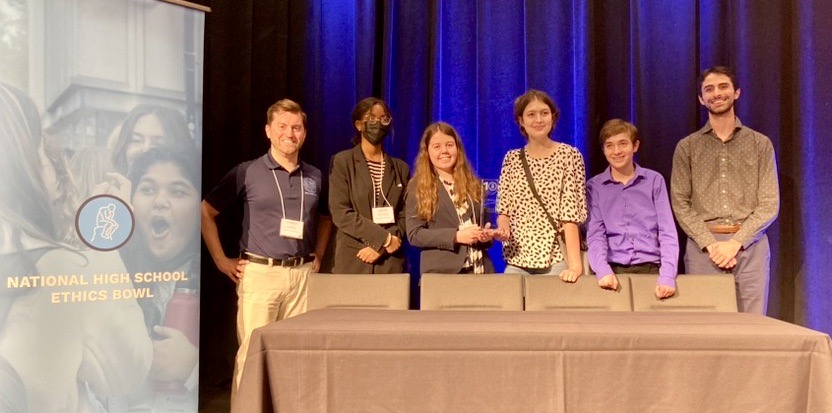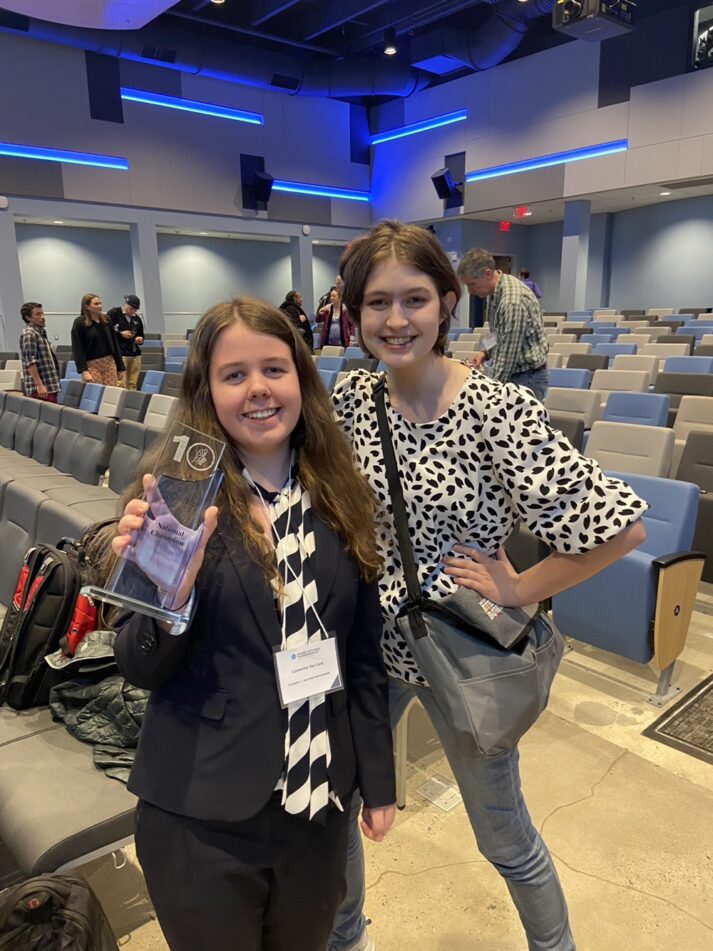Skyline’s team is the first in Michigan to claim the top honor at the National Ethics Bowl Championship

The Skyline Ethics Team’s exceptional dialogue and deliberation skills on contemporary moral issues earned them the national championship, despite their youth. Over the weekend, the “Philosophical Zombies” won the National Ethics Bowl Championship in Chapel Hill, North Carolina, making the team of four students the first team from Michigan to win the national title.
The national champs include sophomore co-captains Catherine van Lent and Kathryn Plotner, junior Shamiso Ruwende, and freshman Ethan Schultz.
Skyline Principal Cory McElmeel says he is proud of the accomplishments, effort, and ethics displayed by the team to win this title.
“The Skyline Ethics Bowl team is truly a group of champions,” says McElmeel. “Our team of four, along with our Coach Gabriel Rettaliata, is full of energy and commitment. Coach Rettaliata volunteers his time, supports the fundraising, and built this team from the ground up along with our students. The Skyline team of four competed against many other districts—some with several teams and many more participants— to win the 2023 NHSEB National Championship.”
Catherine joined the team last year as a freshman.
“I first joined out of curiosity,” she said. “I didn’t know anything about ethics, and I thought ethics sounded impressive and interesting. I became invested in it pretty quickly though. It was lots of fun and also great for learning how to put difficult concepts into words.”
Kathryn Plotner also joined last year as a freshman and this has been Ethan and Shamiso’s first year on the team.
The Michigan Bowl is organized and produced by A2Ethics, the Michigan-based public philosophy network, in partnership with the University of Michigan Department of Philosophy Outreach program. The campus community partnership is also 10 years strong.

This team itself has only been around for four years, so to not only win the Michigan Bowl, but then to be the first Michigan team to win the National Championship is “just amazing,” says the team’s coach, Gabriel Rettaliata, AP Biology/ Biology/ Forensics teacher at Skyline, noting that he feels incredibly fortunate to have such talented students on the team.
He says that what’s particularly impressive about the students on this year’s team is that they are so young.
“The teams they were going against generally had older students, and in particular the North Carolina team we went against in the semi-finals—who were actually from Chapel Hill; talk about a home team advantage!—and the New York team we went against in the finals were both entirely seniors.”
The Skyline team wasn’t fazed.
“They took the challenge head-on and put together excellent presentations, and kept their poise and wits about them in the face of questions from judges that ranged from college professors to the people involved with the Parr Center for Ethics—the organization from UNC who organize the National Bowl,” says Rettaliata. “I could easily picture Catherine or Kathryn going toe to toe in an ethical discussion with a Supreme Court judge if the opportunity arose.”
One of the situations discussed in the semifinal round was the responsibilities of female college athletes serving as role models who create provocative content on social media. The situations they discussed in the final round were the use of chatGPT to write college admissions essays and the use of a randomized control trial in an experiment that involved giving some people living in poverty money and others no money and studying the results.
Rettaliata says it was a challenging competition, but the team was as prepared as could be.
“We’d been discussing the 15 different cases that were available to be chosen for the rounds since they became available in mid-February, oftentimes meeting multiple times a week both in person and over Zoom,” he says. “They did great that first day and were feeling confident, and then they lost the fourth match of the day 3-0. We were able to debrief though, make some adjustments to our strategies, and thankfully made it through to day 2, where we were able to put those adjustments into action, and in the end, they clearly paid off. I’m proud that they were able to take that loss on the chin, and get right back up again and work to make sure they didn’t get knocked down again.”
Asked how it felt to win the championship, Kathryn responded that it felt like a tidal wave, a lightning bolt, a whirlwind, with the team in the middle.
“It’s not any one of us that won,” she said. “No, we are a many-headed single organism, the team, and we are magnificent in this moment, in this everlasting instant.”
Ethics Bowl season begins in September when teams—each school is allowed two teams—are recruited and formed by Bowl school teacher coaches.
Over the 10 years of the National High School Ethics Bowl, Michigan champions have come close to winning (Ann Arbor Greenhills School), and have won the prized Spirit Award (Wayne Memorial).
But this is the first team, and Ann Arbor Skyline is the first school, to claim the top honor as national champion.
“It is an exceptional achievement for the Skyline team,” says A2Ethics President Jeanine DeLay. “At the same time, it is a recognition of the strength of the Michigan Bowl program and all the students who participate. Undoubtedly, the Bowl is an intense competition that each team wants to win.”
She attributes their success to everyone who participates in and contributes to this program—from students and coaches to volunteers and supporters.
The program has opened a new door for Michigan high school students to join an academic extracurricular that gives them an opportunity to learn, listen and think together about real-world issues with an ethics lens and from different philosophical perspectives, said DeLay, noting that since the first Bowl, just over 1,000 Michigan high school students have joined the Bowl program.
The main event: the champions of the tenth anniversary round, finally announced: it’s us. It was us.
Kathryn Plotner
Kathryn recalls preparing for nations after learning they had won regionals against Findlay High School in Ohio on Feb. 15.
“We met for multiple hours a week, often over Zoom, to exhaustively discuss each of the fifteen new cases; the weeks we had up to Nationals for discussing each were substantially fewer than we’d had for States, so we really crammed, especially in the weeks before Spring Break. We also sought grants from our PTSO and the Parr Center.”
She noted that at nationals, the first day of competition was four preliminary rounds that determined whether they’d progress to the next day. They kept refreshing the website til they realized they had ranked eighth of eight teams, and were in.
“That night, I was so sick I couldn’t sleep,” she said, recalling her anxious dreams and being sick to her stomach, then worrying that she was coming down with something.
“The quarterfinal rounds, for me, were a bit of a blur,” she recalls. “I was shivering and the lights were too bright, both alleviated by parents lending clothing and the coaches asking the organizers to turn down the lights. The round was delayed by mishaps with judge placements, but eventually went on. By luck of the draw, we were going second. Our competitors were given a case and question on Olivia Dunne as a role model, and proceeded to present on her as dually feminine and athletic, breaking stereotypes in that way. We inquired for three minutes about what being a role model entailed, pressure on minorities, how to escape being a role model, and how to ensure multiple perspectives were presented.”
All the while, she struggled to stay awake.
“In our own case, we talked about the Italian government’s duty towards immigrants vs non-immigrants. I can’t remember our opponents’ questions exactly; maybe something on where the different duties sourced from, but that could be from a judge. After they announced we won, we went to the grand banquet hall for lunch, where our coaches proceeded to inform us we’d done everything right.”
She recalls the semifinals:
“No matter what happened, at this point, we were going to get an award. We were going against the home team, Chapel Hill. I was feeling better, sans hat, keeping the sweater. A camera crew filled in a semicircle; apparently, they were making a documentary. They told us to ignore them, but it’s hard to ignore the large doe-eyes of a camera lens; my eyes kept flicking to them and back. We could still turn the lights down, a bit. They held a big boom mic over the judges, and moved to keep it there, like a halo.
They got a case of NEOM, City of the Future, the Line- can Americans move there? What do they have to consider?- and their case was hard to follow, but we pushed out three minutes worth of questions and waited, patient, for our turn, impatiently discussing what the next case could be on scraps of paper shoved back and forth. We were down to four viable options, but one was absurd: GMOs, ChatGPT, GiveDirectly, and the Baby Case.
Of course, we got the baby case. Everyone thought it was ridiculous, because it was. It was a mix of eugenics and the good of childbirth and altogether a frankly bizarre case. But, somehow, we won, again. There was someone, on the other team, whose face fell when the results were announced, but almost comically so. There were my teammates beside me, and the camera crew around us, and our coaches and parents scattered about the room. This is the way I took it in.
About an hour passed. We tried to figure out our opponent: Medford or Regis? They said the announcement will be at 2:30. It wasn’t. We waited, looking up the other schools and tossing tidbits of information about them to each other. The coaches came, offer to take our bags. 2:55. 2:56. The clock kept moving, time kept moving. We stayed in our seats until we didn’t. I head up to the stage to inquire, but don’t. Finally, finally, they called Skyline High School and Regis up to the stage. I’m closest, and I remembered to head to the left, because Catherine said she preferred it. Our lucky side.
There was a livestream and bright yellow lights, less warm than the theatre stage’s but brighter. There was an extra chair, because teams are supposed to be five, and we had four. We could all fit on a single side of a table, though, or well enough. There was a microphone, but there was a problem with feedback, so they had to detach them from their stands and have us pass them around.
Us first. The GiveDirectly case, and we rambled, for six minutes, and time goes taffy-fast and treacle-slow, when you’re watching it. We finished our case and they finished theirs as we waited, waited, waited.
Waited off the stage and in the crowd, where my body felt light and weightless. Everything was waiting. Award after award. The casewriting competition- both Catherine and I had a stake, submitted cases. They read off honorable mentions and I heard my name, and it was unbelievable. Exhilarating. The main event: the champions of the tenth anniversary round, finally announced: it’s us. It was us.

Be the first to comment